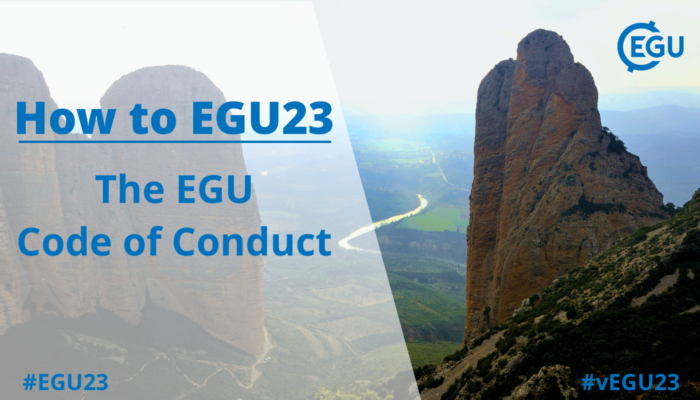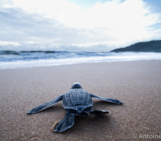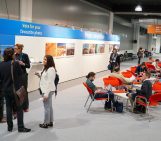
Can you hear that? That’s the countdown to Europe’s largest geoscience conference – now a little over a week away! EGU’s General Assembly #EGU23 is taking place between 23 and 28 April 2023, both onsite in Vienna and virtually. As we ready our calendars to make the most of the conference week, we’d like to remind our community that EGU is strongly committed to the principles of inclusivity and diversity and we require our members and attendees to treat each other with basic courtesy and respect. This is why you may notice on all our guidelines we state that anyone who participates in EGU23 must behave according to the EGU Code of Conduct.
You can read the full code of conduct here: EGU_Code_of_Conduct.pdf
Since this year’s General Assembly is a hybrid one, i.e. taking place on-site and virtually, we selected a few key points to emphasise in this blog.
Most importantly, open and respectful conduct, based on basic politeness, is expected of all EGU23 participants. The EGU also expects all members and attendees to pursue integrity, honesty, respect, courtesy, responsibility, rigour, and equity in their professional activities.
Respectful behaviour
We expect our EGU members and EGU23 participants to behave respectfully. This behaviour encompasses many facets, including:
- The EGU values diversity and equality as essential values to ensure an ethically correct and respectful approach to scientific discrimination, harassment, bullying, coercion, intimidation, censorship and plagiarism are considered unethical behaviours.
- The EGU requires that its members carry out research and draw their conclusions based on critical analysis of the evidence. Findings and interpretations are expected to be reported fully, accurately and objectively, along with the related uncertainties.
- The EGU encourages the use of reporting methods that ensure verification and reproducibility by others. Making data findable, openly accessible and interoperable, and allowing data exchange and re-use between researchers, are encouraged, as are making software and codes freely accessible.
- The EGU emphasises that author credit should only be given to those who have meaningfully contributed to the research. The names and roles of all people who made significant contributions should be properly acknowledged.
- The EGU encourages officers, members and people taking part in EGU activities to clearly distinguish professional, scientific-based comments from their personal opinions when publicly presenting their work and/or engaging in public discussions related to EGU activities.
- The EGU encourages members to take responsibility to act or intercede, where possible, to prevent misconduct. It also recommends that any case of misconduct be promptly reported.
The EGU encourages open discussion on social media (Twitter, Facebook, etc.) and blogging platforms during EGU23. However, you should never post or share any images or video online without the authors’ explicit permission. Please respect any request from an author not to disseminate the contents of their presentation or display.
Reporting violations
All participants of EGU23 are expected to follow EGU’s Code of Conduct. Should you observe or experience violations against these rules, please contact the General Assembly programme committee chair at programme.committee@egu.eu and/or send an email to conduct@egu.eu. Messages to this latter address are treated confidentially and are only read by the EGU president and EGU’s person of trust. You can also contact the person of trust onsite at the information desk in the entrance hall. Violations to the rules of conduct, or misconduct, will be taken seriously and appropriate actions will be taken where necessary.
Misconduct is defined as a violation—proven by evidence—of the standard codes of scholarly conduct and ethical behaviour in scientific research. Misconduct includes the unethical and/or biased treatment of people in a professional setting and while participating in scientific activities. It also encompasses actions such as discrimination, harassment, bullying, coercion, intimidation, censorship and plagiarism.
Misconduct does not include errors of judgment; honest errors in the recording, selection, or analysis of data; or differences in opinions involving the interpretation of data and results. The EGU may undertake an investigation and decide to take action when misconduct is reported by any person and is directly connected to an EGU activity. EGU may also investigate cases that may have an impact on the reputation or integrity of the Union.
Sanctions imposed by EGU for misconduct may include, but are not limited to, the following:
- Written advice or admonition;
- Removal from an official EGU position;
- Withdrawal/retraction of presentations and published material;
- Suspension from delivering presentations at—and convening—EGU meetings either temporarily or permanently;
- Denial or revocation of honours and awards;
- Notifying the home institution of the person responsible of misconduct;
- Issuing a public statement regarding the scientific misconduct.
It is necessary for us to make the EGU Code of Conduct a clear and central part of EGU23, but we have confidence in our community’s ability to be respectful, inclusive and professional, especially during these times of new conference formats. Please be empathetic in your interactions with other people, and we know that we will be able to have a really great meeting!
Contact email address to report violations of the EGU code of conduct: conduct@egu.eu
You can also contact the General Assembly programme committee chair at programme.committee@egu.eu




